A B Corp, or Benefit Corporation, is a for-profit company that has received certification from B Lab for upholding high standards in terms of ethics and environmental and social impact in their business operations. Basically, B Corps are companies with a conscience or a commitment to corporate social responsibility (CSR).
Registering your business as a B Corp is a good way to connect with consumers—especially since today’s consumers are very much invested in the values of the brands they support. Below, find out how to become a B Corp, the certification process, and the pros and cons of B Corps.
What Is B Corp Certification?
B Corp Certification is the process through which a company must go if it wants to be classified as a B Corp. To earn this certification, a company must:
- Demonstrate high social and environmental performance
- Make a legal commitment by changing their corporate governance structure to be accountable to all stakeholders
- Exhibit transparency by sharing information about their performance publicly
What Is B Lab?
B Lab is the entity that monitors and sets standards for B Corps. While B Corps are for-profit, a B Lab is a non-profit entity. It was formed in 2006 to inspire and encourage for-profit businesses to be mindful of their impact on the world around them. In addition to B Corp reviews and management, B Lab “creates standards, policies, tools, and programs that shift the behavior, culture, and structural underpinnings of capitalism.”
B Corp Certification Process
The certification process for B Corps takes time, but since there is a single certifying entity, it is pretty straightforward. The whole process can take six to eight months for small businesses; longer for larger businesses or those in “controversial industries” like debt collection and pharmaceuticals.
To certify your company as a B Corp, you’ll need to do the following:
Step 1: Contact B Lab for Certification Requirements
B Corp certification standards are equally applied to any business type and size. However, industries and business operations vary widely, so the physical and operational changes required to comply with B Corp standards will differ. So, start your B Corp certification process by visiting the B Lab website or contacting a local B Lab office to see how you can meet standards.
It’s best to start this conversation before you begin the assessment process. Knowing what changes you need to make and making them before you pay for an assessment will save you time and money in the certification process.
Step 2: Ensure Your Business Meets Legal Requirements
B Lab has established legal guidelines to protect the integrity of its principles. B Corps must make a legal commitment to adhere to stakeholder governance, a principle that legally requires the business to account for the benefit of workers, communities, customers, suppliers, and the environment. This usually requires businesses to update their articles of incorporation and may even require them to change their business structure.
Local business laws vary by state, county, and sometimes even city, so B Lab’s legal commitment requirements also vary. You’ll need to refer to your local business administrator (which is usually your state’s Secretary of State’s office) and your local B Lab office for guidance.
The B Lab website also contains a quick search tool with instructions by location. You simply complete each dropdown field on the search tool to get preliminary information that applies to your location.
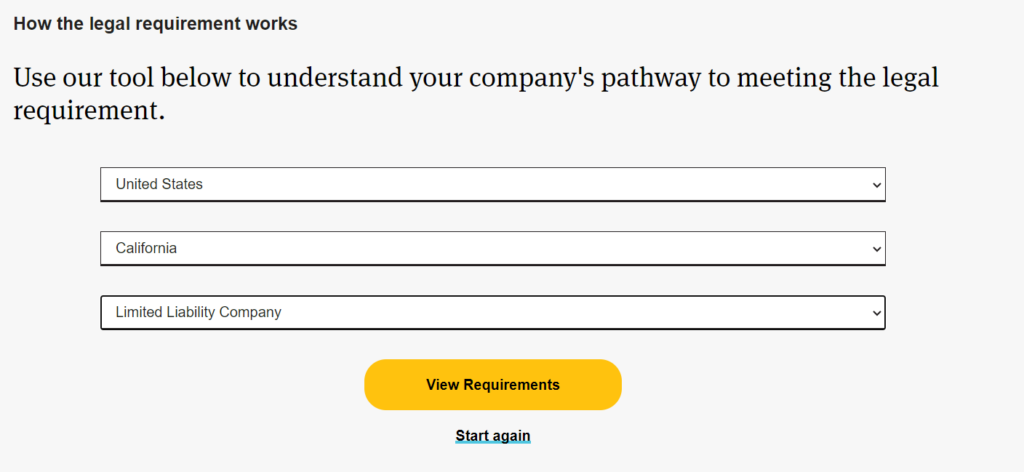
You can find legal requirements for your area and business structure using B Lab’s legal search tool. (Source: B Lab)
As part of the assessment process, you’ll be asked to upload evidence that your business meets the legal requirements for certification. Making changes can take some time—the sooner you begin the process of updating your business structure, the faster your certification process will go.
Step 3: Complete the B Corp Assessment
Now it’s time to begin the assessment process. B Lab needs to get a baseline picture of your current business operation to identify how well you currently meet B Corp standards. To measure this, B Lab created an assessment—the B Impact Assessment (BIA).
The BIA is B Lab’s tool for measuring, managing, and improving your positive impact on your customers, staff, community, suppliers and vendors, and the environment. You’ll need to score 80 or above (out of a possible 200) on the BIA and pass a risk review to get your designation.
Before taking the assessment, gather business information from your previous 12 months of operations. You’ll need information about your employee demographics, ownership percentages and demographics, suppliers and their employee demographics, and your environmental impact. Then, navigate to the B Lab website and select the B Impact Assessment.
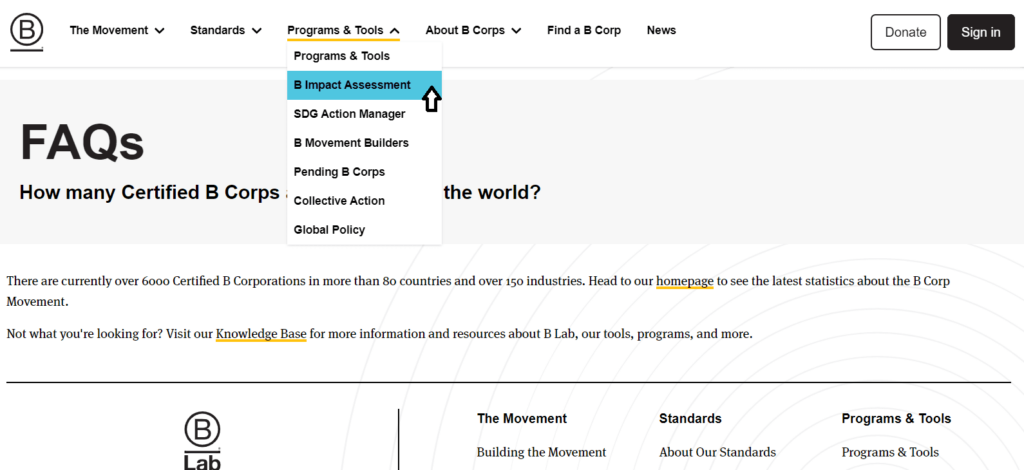
You can access the Business Impact Assessment on the B Labs home page. (Source: B Labs)
B Corp designations are only awarded to existing businesses that have operated for at least a year. If you are just starting a business and want to pursue B Corp designation, B Labs will let you start the process, though your full certification will be pending until you complete one year in operation.
Step 4: Submit B Corp Declaration
Within four weeks of completing your online assessment, the owner or a principal of the company will need to send a signed statement saying that, to the best of their knowledge, the information provided in the assessment is accurate. They will also be prompted to write a description of their understanding of the assessment itself and how it was completed.
Step 5: Get Risk Assessment
Once B Lab receives your BIA, they will match you with a B Labs analyst. Your analyst will guide you through the rest of the certification process. Depending on your business type, size, and industry you may need to provide additional information or undergo additional assessments (like site visits to production facilities if you manufacture products).
Step 6: Pay Certification Fees
Once you submit your assessment, you’ll need to pay a one-time submission fee. The fees are on a sliding scale and are based on your business’s gross revenue from the prior year. A small business with less than $500,000 in gross annual revenue would pay $150 in submission fees, while a business with over $500 million in revenue would pay $900.
You can determine your submission fees using the B Labs fee calculator.
Step 7: Be Transparent
Once you have been assessed, and paid your certification fees, B Corp certification requires businesses to publicly share their B Corp status and overall and individual category scores on the B Lab website.
Depending on your business size, you may need to share a public statement on your website and business materials. Typically, larger, more profitable companies and those in controversial industries are asked to share public statements announcing their commitment to B Corp standards. You’ll also need to sign the B Corp Declaration of Interdependence
B Corp Declaration of Interdependence
The B Corp Declaration of Interdependence is a statement that all B Corps are expected to sign. It is a key tenet in the B Corp ideology. It reads as follows:
“We envision a global economy that uses business as a force for good. This economy is comprised of a new type of corporation—the B Corporation—which is purpose-driven and creates benefits for all stakeholders, not just shareholders.
As Certified B Corporations and leaders of this emerging economy, we believe:
- That we must be the change we seek in the world.
- That all business ought to be conducted as if people and place mattered.
- That, through their products, practices, and profits, businesses should aspire to do no harm and benefit all.
- To do so requires that we act with the understanding that we are each dependent upon another and thus responsible for each other and future generations.”
Many B Corps also place this declaration somewhere on their website, typically on an ‘About Us’ page. If you’ve gone through the process of getting a B Corp certification, using the Declaration of Interdependence on your social media and website or posting in your brick-and-mortar location can be a great way to educate your staff and customers about it.
Step 8: Pay Ongoing Fees
New B Corps will need to pay annual fees to maintain their certification. For businesses with gross annual revenue lower than $500,000, the current annual fees are $2,000 per year. The fees go up to $45,000 annually for businesses with a gross annual revenue of $500 million. Companies with larger revenues will have custom fees assessed.
B Lab also offers an equity program to make the certification process more accessible for historically underrepresented groups in the business area. Black-owned, Indigenous/First Nation-owned businesses, as well as those owned by women, minorities, LGBTQIA+ individuals, veterans, and persons with disabilities, and any with less than $100,000 in annual revenue, qualify for lower annual fees.
How to Recertify as a B Corp
B Corps are required to recertify their status every three years. This requires another assessment. The B Corp must then share its updated assessment score as part of its commitment to transparency.
Not every business is eligible for recertification. To qualify, your business will need the following:
- An updated BIA score from no more than six months prior
- An account in good standing
- No unpaid annual fees
- Completed legal requirement
- Any additional requested documents
You’ll need to submit that information to B Lab. Once reviewed and confirmed, your recertification is valid for another three years—after which, you can start the process all over again.
Advantages of a B Corp
Being a B Corp can offer a number of advantages and benefits for small businesses. Here are some examples:
Growth
A 2023 Insights Report from B Lab found that from 2019 to 2021, B Corps were more likely than traditional businesses to grow revenue and worker base. That figure is even more powerful considering those were pandemic years when many businesses struggled. The B Corps in the study grew average revenue from 23% to 25% annually in the years studied.
Build Credibility & Trust
Associating your business with the well-known B Corp certification is an immediate sign of trust and transparency to potential customers. It signals that the business is committed to high standards of social and environmental performance and accountability.
This trust can also help you stand out in a crowded market by showcasing a commitment to positive impact. Consumers are increasingly looking to support companies that align with their values. Plus, some markets and channels prefer or even require B Corp certification for their suppliers or partners.
Access to a Supportive Community
When you certify as a B Corp, you join a global community of like-minded businesses. This allows for networking, partnerships, and collaborations. It also grants you access to resources and support from the B Corp community.
Improved Employee Engagement & Retention
Many modern-day workers prefer to work for companies committed to social and environmental causes that matter to and impact them. Employees often feel more motivated and satisfied working for a company with a strong sense of purpose. The B Lab Insights Report found that more B Corps retained employees through the challenges of the COVID-19 pandemic than traditional businesses.
Operational Benefits
Because of its focus on sustainability and good governance, B Corps can also help mitigate risks related to environmental, social, and governance (ESG) issues—all of which can be costly to both society and your business.
Financial Benefits
B Corps are interested in sustainable business practices. Investments in sustainability can bring cost savings when it comes to things like energy use, waste management, and supply chain management.
While efficient operations are financially beneficial, B Corp status can also increase your chances of securing funding. Impact investors are increasingly interested in businesses that demonstrate strong ESG practices. B Corp certification can attract impact investors.
Contribution to a Better World
If you operate as a B Corp, you can really feel good about your business. It’s one thing to start a successful company as an entrepreneur; it’s entirely different to make a positive impact while enjoying business success.
By aligning business practices with social and environmental goals, B Corps contribute to broader societal and environmental well-being. B Corps lead by example, encouraging other businesses to follow in their footsteps.
Disadvantages of a B Corp
While becoming a B Corporation has many benefits, you might face some challenges. Here are some key points to consider:
Costs
B Corp certification comes with fees. The applicable fees vary depending on your sales volume, but the range can be from $1,000 to $50,000 annually. You’ll also have the costs of any investments you need to meet B Corp requirements. However, a survey of 20 B Corp studies indicates that these initial costs are quickly recouped.
Time
B Corp certification doesn’t happen overnight. The certification process involves a time-consuming, comprehensive assessment. Plus, you’ll have to invest time undergoing continuous monitoring and reporting, which adds an administrative burden.
Operational Challenges
To meet B Corp standards, you might need to make significant changes to operations, supply chains, and governance structures. This can be difficult with limited resources to dedicate to certification and ongoing compliance.
Potential for Mission Drift
At the end of the day, your business is meant to make a profit and provide a means of income for you and your employees. Pursuing B Corp certification may shift the focus from profitability to service and mission-driven goals. Serving customers, employees, investors, and the community all at once can be a tricky balancing act.
Increased Scrutiny
B Corps are subject to higher scrutiny from the public, media, and stakeholders, which can amplify any shortcomings or failures. More transparency could make you an easy target for criticism, especially if issues arise.
Legal & Regulatory Compliance
Keeping up with regulatory changes and ensuring ongoing compliance with B Corp standards can be challenging. In some jurisdictions, becoming a B Corp may require changes to the company’s legal structure. Depending on what you need to modify, this can be complex and costly.
4 Examples of B Corps
Bonterra Organic Estates
Bonterra Organic Estates is a winery and vineyard that uses organic processes in its production. In addition to being B Corp certified, Bonterra is also Regenerative Organic, Climate Neutral, and TRUE Zero Waste-certified. It’s truly committed to reducing its negative impact on the community around it.
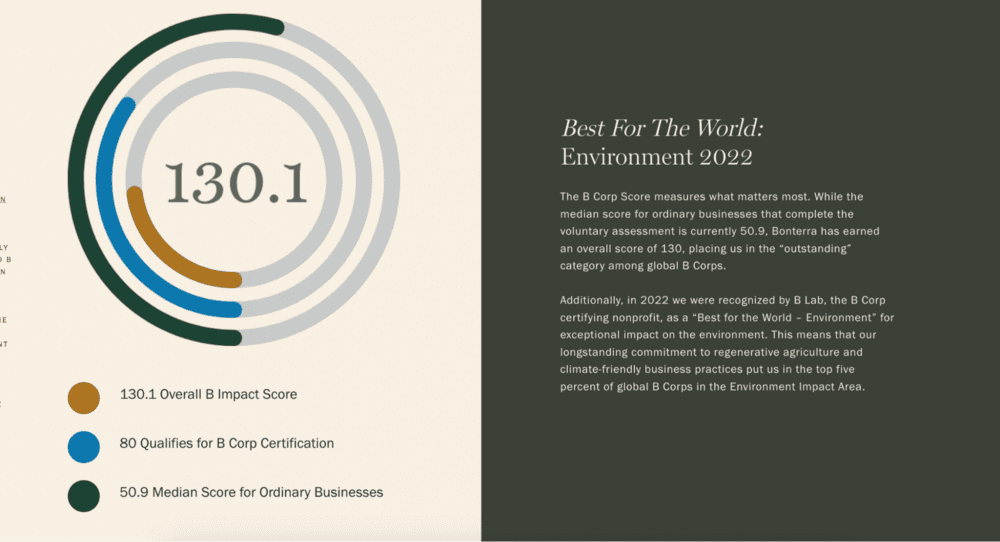
You can learn about Bonterra’s various commitments to ethical practices, including information on its certification as a B Corp, on its website. (Source: Bonterra Organic Estates)
Cariloha
Cariloha is a “sleep goods” brand—mattresses, bedding, pajamas, etc.—with a B Corp designation. Its products are made with sustainable bamboo materials, honoring its commitment as a B Corp. It shares its impact and how it has reduced driving emissions, water waste, and energy waste in its operations.
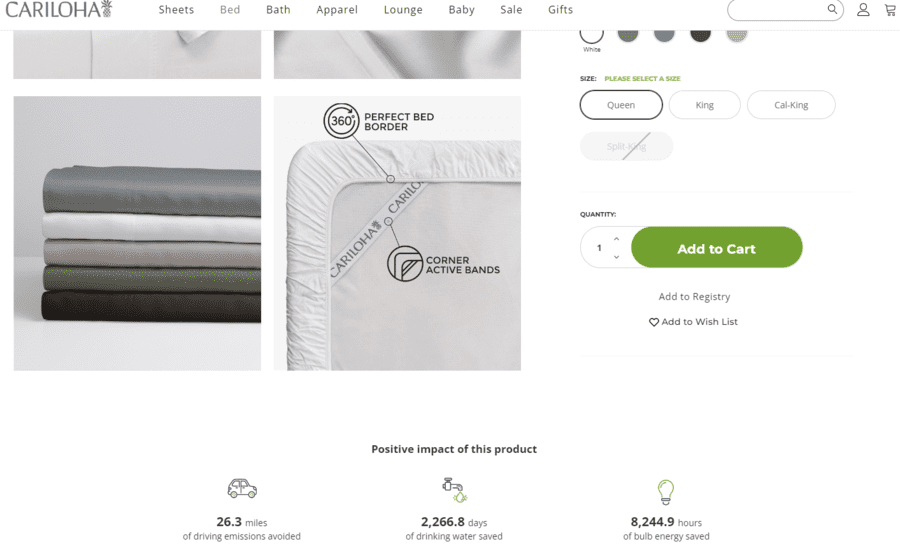
Cariloha lists the positive impact of its products directly on each product page of its website. (Source: Cariloha)
Each product page on the Cariloha website includes information about the the product’s positive impact so customers can see exactly what their purchases support; reduced carbon emissions, energy savings, and more. This is a great way to leverage the information gathered to support their B Corp designation.
Persephone Brewing Company
South Carolina-based Persephone Brewing Company sells products both online and at its tap house. In addition to (or perhaps support of) its B Corp status, Persephone does a lot to give back. It participates in community farm programs like produce boxes, farmers markets, and selling bulk organic feed.
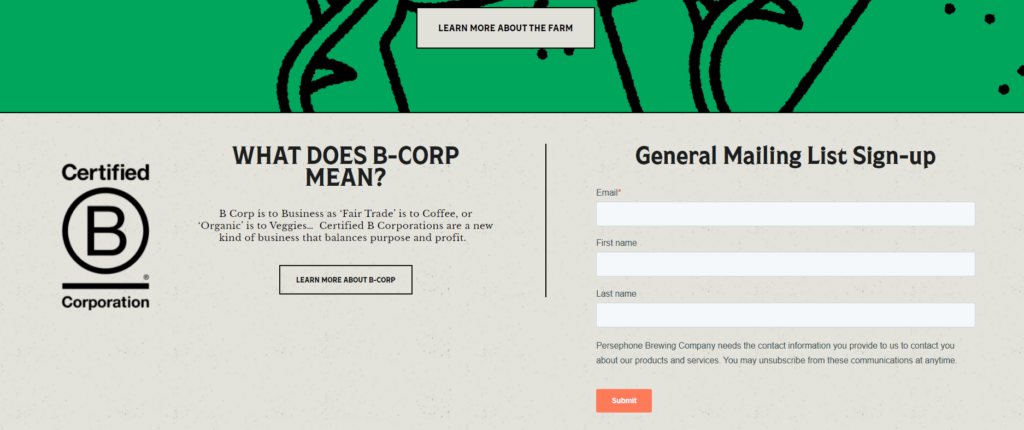
In addition to listing the many ways it gives back, Persephone Brewing Company includes a section about its B Corp certification where you can learn more on its website. (Source: Persephone Brewing Company)
Berkshire Cider Project
Berkshire Cider Project sells dry sparkling ciders from its Massachusetts cidery. Married founders Katherine Hand and Matt Brogan credit much of their success to Berkshire Cider’s B Corp status, saying,
“This certification has strong communications and marketing benefits. It sends a powerful message about our commitment to acting responsibly and caring for our employees, community, and the environment…Already, we have seen a very positive reaction from customers and partners about our B Corp status.”

Katherine Hand and Matt Brogan started the Berkshire Cider Project in 2019. (Source: Berkshire Cider Project)
Berkshire Cider Project is an excellent reminder that even small businesses can become B Corps. Some of their current focuses are using local, foraged apples to produce many of their ciders, using equitable hiring practices, and donating 2% of annual proceeds to local nonprofits.
Frequently Asked Questions (FAQs)
These are some questions people typically have about B Corps.
When a company is a B Corp, it means that it underwent B Lab’s certification process for ethical business practices. B Corps are committed to positively impacting society, workers, the community, and the environment while making a profit. The nonprofit B Lab certifies B Corps to meet rigorous standards of social and environmental performance, accountability, and transparency.
While both are ethically minded organizations, a nonprofit doesn’t operate for a profit, while a B Corp does. Additionally, nonprofits don’t have to meet the same B Lab requirements and standards. Instead, nonprofits must comply with government regulations. Either business type can model ethical and sustainable business practices, but since profit-making is built into the B Corp model, you won’t see any nonprofit B Corps.
Yes, B Corp is a good thing. It means a business is operating in a way that minimizes its negative impact on the surrounding community while increasing positive impacts like reduced carbon emissions and equitable hiring practices.
There are some challenges for business owners pursuing a B Corp designation. There are costs to updating your business to meet B Corp standards, and there are costs associated with applying for the designation. There
- Cost
- Time
- Operational challenges
- Potential for mission drift
- Increased scrutiny
- Legal and regulatory compliance
Bottom Line
B Corp certification can undoubtedly be worth it, especially if your business is already operating in a way that positively impacts all stakeholders and the environment at the same time. While costly, B Corp certification can boost your brand reputation and grant you access to tools and a network that can help you grow your business in an ethical way you can be proud of.